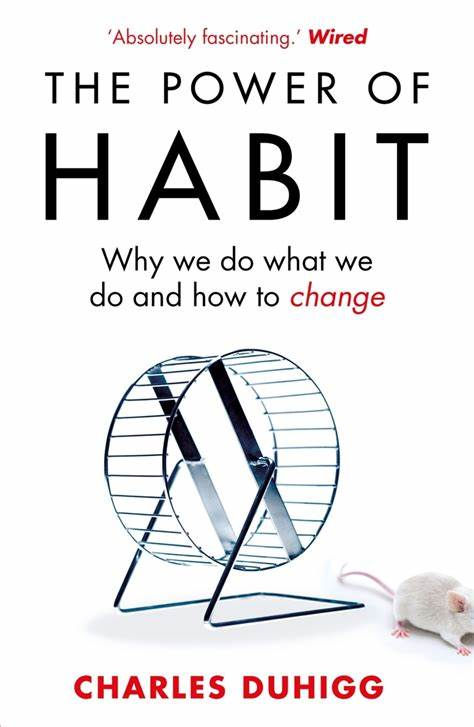The Power of Habit
- Spartan Stoic

- Jan 27, 2023
- 4 min read
by Charles Duhigg
With the turn of the new year I’m reading several books on habits, such as James Clear’s frequent bestseller Atomic Habits and Katy Milkman’s How to Change, so now seemed a good time to review Charles Duhigg’s The Power of Habit. This book has actually been around for a decade now, but is quite a popular one regarding habits, so let’s see if its any good.
Charles Duhigg is an investigative reporter for The New York Times, and has written two books: the power of habit and Smarter Faster Better, another book on similar themes but with more of a focus on productivity.
The premise for this book then is to review aspects that are important to habits. How can we understand habits better to move them towards being more effective and productive? It splits the question up by looking at three areas: the habits of individuals, habits of organizations and the habits of societies.
The first aspect that immediately stands out in this book is the prose. Duhigg evidently writes quite a bit, because the stories flow well, are structured well, and make for an enjoyable read. I found myself reading much larger amounts that I thought I had because of this.
The approach is a similar one for these scientific, non-academic, books. By which I mean the frequent, mass market books that aren’t written for academia. Within each chapter, we have a couple of stories to illustrate a particular aspect or two about habits, then an explanation of what the story is highlighting. At the end of the book there is an appendix with some practical points to implement when tackling habits. I would have liked to have seen a more extended or thorough look at practical use for the information, since really I think this is what most people are buying this kind of book for, and the ideas – although useful – do seem limited.
The Story of Habits
The stories throughout the book are interesting though. The most famous one is the one of Montgomery Bus Boycott, featuring Rosa Parks and Martin Luther King, used to highlight the momentum and unity of people when standing together despite the threat of violence (much of which ended up occurring).

There was my personal favourite story of Paul O’Neill, the new at the time CEO of Alcoa – the Aluminium company of America, turning around the company’s fortunes from an unexpected angle of emphasizing safety. This was a bit of a sleeper hit from a story that, on the face of it, sounds tedious, as the CEO’s surprising approach brought the company together, saved lives, and helped propel it forward.
Some, more routine stories feature: the NFL, religion, starbucks, gambling. These don’t exactly sound novel: how many stories are there of big companies turning things around, or of the influence of religion giving meaning, or the sports team that defies the odds? But they are written in such a way that – to get really cliched – make it a page turner.
My main criticism of the book would lie with the stories, surprisingly. Despite – as I said – their being very readable, sometimes they did seem to meander slightly and I forgot I was reading a book on habits. The summaries at the end, though, did help to tie it together. But often the story would be more fleshed out than was perhaps necessary, because often the point being made was quite a simple one or conversely, seemed to go off on an extraneous tangent.
Learnings
But what exactly does the book uncover about habits? Well, small diagrams throughout the book emphasize the importance of ‘cue – routine – reward’. Understanding that habits are deeply entrenched in this ‘habit loop’ provides us with the opening to analyse and dissect it. Through that, can one think about how addictions get entrenched by a cue, workers within companies stick to patterns and avoid disruption so they don’t alienate their peers creating routines, or a gambler gets a high and ignores their problems through the chasing of reward.
The advice at the end of the book for dealing with bad habits, for example, recommends noting down where you are, what time it is, your emotional state, who else is around and what action preceded the urge. By noting this down when engaging in the habit, and when you modify it, you can find the real motivation behind it. Identifying the routine, changing the rewards and isolating the cue that induces the bad habit helps to break down and plan to change it. It seems like a good approach, based off of the findings.
Maybe that isn’t a massive issue though. The stories are fun to read, and do have a point. If they got bogged down in aspects of habit making, it might be the case that the book was more of a chore to read. Some might find that there isn’t enough information here, as it really isn’t a thorough dissection of everything pertaining to habits.
Final score
In conclusion then, this book is a great read. It is just about the right length, and introduces you to aspects of habit-making. I would say that other self-help/non-academic science books will contain more advice and facts. A book I also just read - Katy Milkman’s how to change - contained a lot more advice than contained here, for example. So if that’s what you’re looking for, you might need to dock a point or two for The Power of Habit. But for the general reader, who wants to read some fun stories and learn a little, this book succeeds.
8/10



